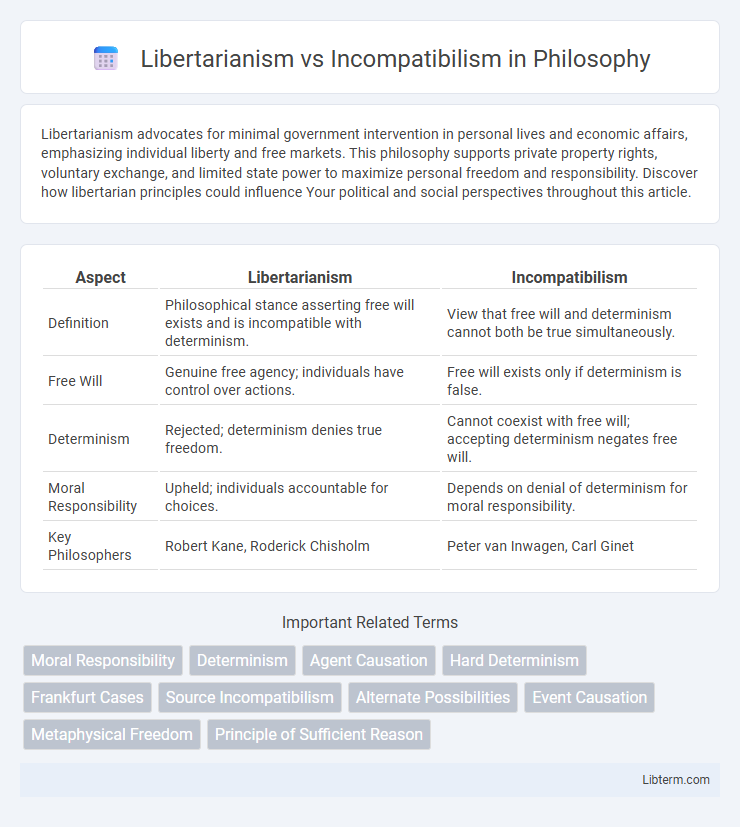Libertarianism advocates for minimal government intervention in personal lives and economic affairs, emphasizing individual liberty and free markets. This philosophy supports private property rights, voluntary exchange, and limited state power to maximize personal freedom and responsibility. Discover how libertarian principles could influence Your political and social perspectives throughout this article.
Table of Comparison
| Aspect | Libertarianism | Incompatibilism |
|---|---|---|
| Definition | Philosophical stance asserting free will exists and is incompatible with determinism. | View that free will and determinism cannot both be true simultaneously. |
| Free Will | Genuine free agency; individuals have control over actions. | Free will exists only if determinism is false. |
| Determinism | Rejected; determinism denies true freedom. | Cannot coexist with free will; accepting determinism negates free will. |
| Moral Responsibility | Upheld; individuals accountable for choices. | Depends on denial of determinism for moral responsibility. |
| Key Philosophers | Robert Kane, Roderick Chisholm | Peter van Inwagen, Carl Ginet |
Defining Libertarianism: Core Principles
Libertarianism, in the context of free will, asserts that individuals possess genuine freedom to make choices uncaused by prior events, emphasizing metaphysical freedom as a core principle. It rejects determinism by upholding that agents have the capacity for alternative possibilities, meaning choices are not predetermined by causal chains. Central to libertarianism is the belief in agent causation, where individuals are the originators of their actions, distinct from deterministic or compatibilist interpretations of free will.
Understanding Incompatibilism in Free Will
Incompatibilism asserts that free will and determinism cannot coexist, emphasizing that true free will requires actions to be uncaused or not predetermined. Libertarianism, a branch of incompatibilism, argues that individuals possess genuine freedom to make choices independent of deterministic laws. This perspective highlights that moral responsibility hinges on the ability to have acted otherwise, rejecting causally determined constraints on human agency.
Historical Origins of Both Philosophies
Libertarianism traces its roots to early modern philosophers like John Locke, who emphasized individual freedom and moral responsibility as foundational concepts, diverging sharply from deterministic views of human action. Incompatibilism, with origins in the works of philosophers such as David Hume and later expanded by Immanuel Kant, argues that free will and determinism cannot coexist, asserting that true freedom requires the rejection of causal determinism. Both philosophies emerged during the Enlightenment, a period marked by intense debates on human autonomy, moral accountability, and the nature of causality in human decision-making.
Key Differences Between Libertarianism and Incompatibilism
Libertarianism asserts that free will exists and is incompatible with determinism, emphasizing that individuals have genuine alternative possibilities in their choices. Incompatibilism is the broader philosophical stance that free will and determinism cannot coexist, including both libertarianism and hard determinism as subsets. The key difference lies in libertarianism affirming free will's existence, whereas incompatibilism only denies their compatibility without committing to free will's reality.
The Role of Determinism in the Debate
Libertarianism asserts that free will exists and is incompatible with determinism, emphasizing that individuals have genuine choice unaffected by prior causes. Incompatibilism underscores the fundamental conflict between determinism and free will, arguing that if determinism is true, moral responsibility and autonomous decision-making are impossible. The role of determinism in this debate centers on whether every event, including human actions, is causally determined, challenging notions of freedom and accountability.
Moral Responsibility Under Libertarianism
Moral responsibility under libertarianism asserts that agents possess free will that is incompatible with deterministic causation, allowing individuals to be genuinely accountable for their actions. Libertarianism emphasizes that true moral responsibility requires alternate possibilities, meaning an agent could have acted otherwise in identical circumstances. This perspective challenges incompatibilist views by maintaining that freedom and moral responsibility cannot coexist with determinism.
Incompatibilist Views on Agency and Choice
Incompatibilist views on agency emphasize that true free will requires the ability to have acted otherwise, highlighting a fundamental conflict between determinism and moral responsibility. Libertarianism within incompatibilism asserts that agents possess genuine freedom that is not causally determined, enabling authentic choice and control over actions. This perspective prioritizes undetermined agency, arguing that responsibility hinges on libertarian free will rather than compatibilist reinterpretations of choice.
Prominent Thinkers and Their Arguments
Libertarianism, advocated by philosophers like Robert Kane and Peter van Inwagen, asserts that free will exists and is incompatible with determinism, emphasizing agent causation and ultimate responsibility. Incompatibilists such as Galen Strawson argue that true moral responsibility is impossible because individuals cannot be causa sui, or self-caused. These thinkers debate the metaphysical foundations of free will, highlighting contrasting views on determinism's implications for human agency and ethical accountability.
Contemporary Critiques and Defenses
Contemporary critiques of libertarianism argue that its reliance on agent causation conflicts with neuroscientific evidence suggesting that choices are determined by brain processes, challenging its account of free will. Defenses of libertarianism emphasize the distinction between physical causation and metaphysical freedom, maintaining that agents can initiate new causal chains independent of deterministic laws. Incompatibilists, both libertarians and hard determinists, continue to debate the nature of moral responsibility, with defenders of libertarianism insisting that genuine free will requires indeterminism, while critics highlight the epistemic and metaphysical difficulties of grounding such indeterminism in coherent agent-based freedom.
Implications for Ethics and Society
Libertarianism, advocating for free will as incompatible with determinism, implies moral responsibility contingent on genuine choice, influencing ethical frameworks that emphasize individual accountability. Incompatibilism challenges deterministic views, potentially reshaping legal and social norms by underscoring the importance of autonomous decision-making in judgments of praise and blame. These perspectives impact societal structures by promoting concepts of personal freedom, justice, and the ethical evaluation of actions grounded in liberty rather than deterministic causality.
Libertarianism Infographic

 libterm.com
libterm.com